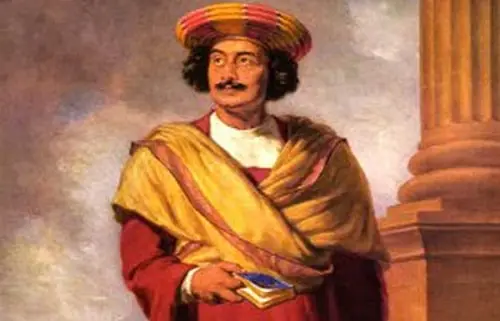The various desires and greed that we, as humans have, often give rise to various evil practices in the society. The hunger for power and authority has often given rise to social malpractices such as the caste discrimination, a woman being denied of education, and so on. However, there have always been various individuals who have always raised their voices against these practices. They have tirelessly worked towards the betterment of the society that we live in. in this article, we shall see the top 10 social reformers of India and their role.
List of Most Famous Indian Social Reformers
10. Ishwar Chandra Vidyasagar
Ranked as one of the greatest Bengalis of all times, Ishwar Chandra Vidyasagar was not only a renowned social reformer of his time, but he was also a well-known writer, educator, philosopher, as well as a philanthropist. In fact, the title Vidyasagar was added to his name as he excelled in Sanskrit and philosophy. For his work on the upliftment of the women, Ishwar Chandra Vidyasagar have won a number of awards and accolades.
The social reformer was mainly remembered for pioneering the movement “Bengal Renaissance.” By influencing and convincing people that widows should be allowed to re-marry, Ishwar Chandra Vidyasagar helped and tried to bring about a change in the status of the women during those times. His contributions are significant which helped in upliftment of the women population in the society.
9. Dr. B.R. Ambedkar
Also known as Babasaheb, Dr. B.R. Ambedkar was a well-known jurist, politician, and a social reformer of his times. He was a great scholar and a student. He won doctorates from the very renowned institutes such as the Columbia University and the London school of Economics.Dr. B.R. Ambedkar, in fact, played an important political role wherein he organized campaigns, published a lot of journals, etc. to free Indian from the British Raj.He was also the first minister of Law and Justice of independent India.
He fought towards mitigating and ending the long prevalent discrimination against the Dalit class or the untouchables as they were called in the society. In fact, it was after his demise that the great Indian scholar was awarded the Bharat Ratna for his immense contributions of ending the social discrimination in the society.
8. Jawahar Lal Nehru
Well, who is not aware of the works and the contributions made to the society by the very first Prime Minister of independent India? He was a barrister who got his education from the Trinity College and the Inner Temple. Due to his work towards Indian politics, Jawahar Lal Nehru was awarded the Bharat Ratna in the year 1955. His birthday, November 14th is celebrated as Children’s day each year.
Not only was Jawahar Lal Nehru instrumental in bringing about the independence of the nation, but he also was instrumental in leading India peacefully after the Country had faced major turmoilsunder the British rule. Besides, he also significantly contributed towards eradication of the caste system that was much prevalent in the society at those times.
7. Baba Amte
Another social reformer who deserves a place in the list of top 10 social reformers of India is Baba Amte. Although born in a very well to do family, Baba Amte devoted his entire life towards bringing about social reforms in the country.
His main reform movement was towards those who were suffering towards leprosy. He wanted to improve their position in the society and he, along with his wife, dedicated his entire life towards the cause. He, in fact, had started Anandwan in the year 1950 which was primarily dedicated towards the leprosy patients of the nation. He won a lot of awards and accolades for his cause. Some of the awards won by him included Padma Vibhushan, Templeton prize, the Gandhi peace Prize, amongst others.
6. Swami Dayanand Saraswati
The founder of the Arya Samaj is next on the list of the top 10 social reformers of India. He was a sanyasi from birth who opposed the ideas of worshipping of the idols, the prevalence of ritualism, etc. in the society.
His major contribution to the social reform lies in his efforts of influencing and convincing people to go back to the Vedas. He also believed in the power of Karma and advocated that one should devote his or her life to the almighty. Besides, he advocated that a woman in the society should have equal rights as that of a man and should receive equal amount of education.
5. Swami Vivekananda
Fondly remembered as the intellectual monk of India, Swami Vivekananda makes it to the list of the top 10 Indian social reformers. He was the chief pupil of Ramakrishna. It was the swami who had introduced the western culture to the concept of yoga and Vedanta. Vivekananda was bent towards learning more and more of spiritual values since the very beginning. His affluent childhood did not deter him from contributing to the social reforms.
The Ramakrishna mission which was set up in the year 1987 contributed to some of the great causes in the society. Some of the aspects in which the mission contributed was bringing about good health care, rural management, higher education, as well as the overall welfare of the people in general.The Ramakrishna mission has been bestowed with a number of awards and accolades which include Dr. Ambedkar National Award, the National Communal Harmony Award, the Gandhi Peace Prize, the Pt. Ravishankar Shukla Award, amongst others.
4. Mahatma Gandhi
Well, amongst the most famous social reformers that India has ever had, Mahatma Gandhi is perhaps one of the most popular figures. Fondly known as Bapu, mahatma Gandhi played a very significant and important role in shaping the modern-day India that we live in today. It was his continuous efforts and struggle that led India to the much- anticipated independence on the 15th day of August, 2018. Born in Porbandar, Gujarat, Mahatma Gandhi was actually trained as a lawyer from the Inner temple. He spent his time as a professional in South Africa and one he returned to India, he influenced the poor farmers, peasants, and others to raise their voices against violence and excessive payment of land-tax.
Mahatma Gandhi, as we all know, was the main pioneer towards following the non-violence movement. His movement led to India’s independence. His movement also inspired a lot of countries to follow the path of non-violence and attain freedom. He also led the famous satyagraha movement also known as the “silent force” or the “soul force”
3. Jyotibha Phule
The social reformer was exposed to caste discrimination that existed in the society since a young age. The Indian reformer was born in a poor family of Satara in Maharashtra. During his growing years, the young man began to realize that the Indian society was full of practices that were uncalled for and he decided to fight against each of these practices.
He contributed towards promoting the education of women. He not only preached about the idea, but also opened the first Indian school for girls. As he became more and more confident and convinced about his ideas, he began to create bigger and better schools. He was also the founder of the SatyashodhakSamaj that aimed to create a society which gave all the citizens their fair and equal rights.
2. Vinoba Bhave
Born in a brahmin family, Bhave believed in the sanctity of all the religions since the very beginning. He was an ardent follower of Mohandas Gandhi and he used to attend his speeches and try to propagate the beliefs and teachings of his teacher.
With an ambition of making women self-dependent on making their own food and feeding themselves, the reformer help find the Brahma Vidya Mandir. It was VinovaBhave who pioneered the Bhoodan movement. This was his own unique way in which he thought justice could be provided to one and all.
1. Raja Ram Mohan Roy

Voted as one of the greatest Bengalis of all time, Raja Ram Mohan Roy was the founder of the Brahma Sabha. It was one of the most important movements in the country that brought about a number of social and religious reforms in the society. Sati was one of the most demeaning practise that was prevalent in the society during his time. He played a pioneering role in helping to eradicate the same. Besides, Raja Ram Mohan Roy also dedicated his life to advocate against the custom of child marriage in the Hindu society and culture. Not only that, the Hindu society had a number of orthodox practices during his time. Some of them apart from child marriage and sati included the concept of untouchability as well. The Indian reformer played a very pivotal role and found against some of these customs.No doubt, he is fondly remembered as the “father of the Indian renaissance.”
Thus, India has produced some of the best social reformers who tirelessly worked towards uplifting and bringing about a positive change in the society they lived in.
Santosh Kumar, He is a SEO + Blogger have 12 years of experience in writing tutorial, informative and product reviews topics.
Page Contents

